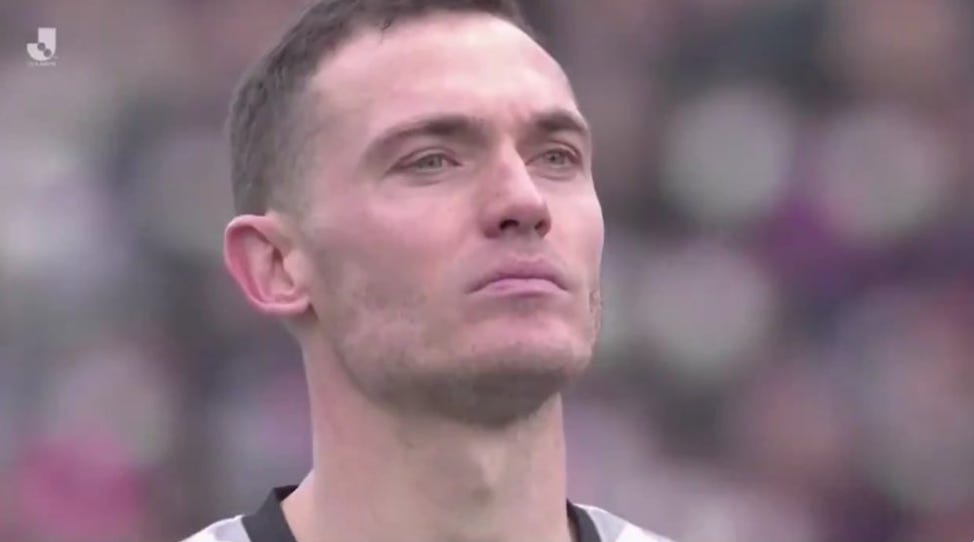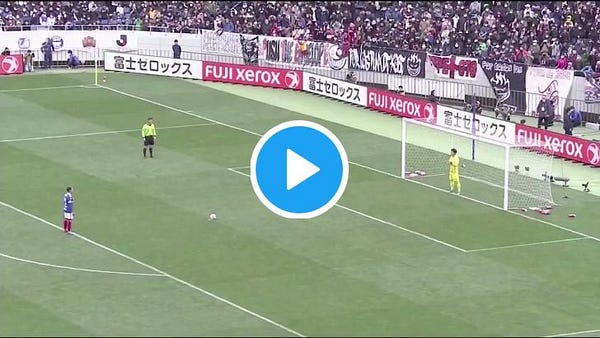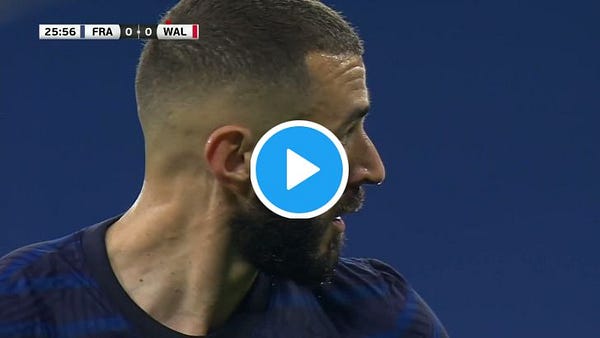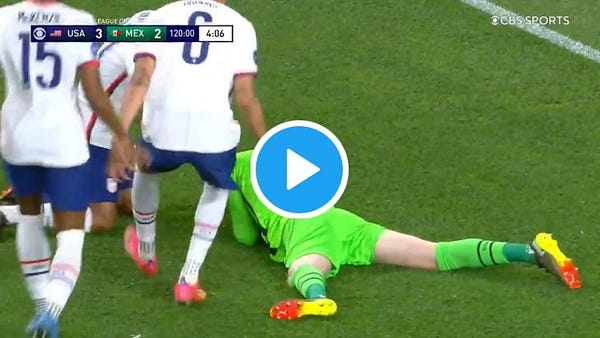The recent Europa League final between Villarreal and Manchester United featured 21 consecutive scored penalties and was memorable for the denouement in which United goalkeeper David de Gea had his vital spot-kick saved. While fascinating to watch, there was, I felt, something missing from the shoot-out. Then I realised what it was: misses.
The most dramatic shoot-outs feature a combination of conversions and misses; we love to see imperfection as well as metronomic success. And so, as an antidote to the 21-in-a-row final, today I am looking at what happened in the 2020 Japanese Super Cup between Vissel Kobe and Yokohama Marinos. This game went to a penalty shoot-out in which NINE penalties in a row were missed (at first, I thought it was a deep fake – but I watched again and it did really happen).
Thomas Vermaelen after he missed penalty number eight
This shoot-out is fascinating to me. It’s relatively recent, yet the big crowd feels from another age; the players are talented (four of the nine have played for their national team) but seem to struggle with the pressure; and the players’ reactions after their misses become increasingly exaggerated (and inadvertently hilarious). Let’s look at what happened.
The match takes place in February 2020, and is notable for two firsts. It is the first match played with coronavirus counter-measures in place, with masks required, temperatures taken, and hand sanitiser stations throughout the stadium. It is also the first high-profile match in Japan to use VAR, which comes in handy as it rules out Douglas’s opener after 20 minutes of his Vissel Kobe debut. The game ends 3-3 (there is no extra-time) and the shoot-out gets off to a decent start, with the first four players converting. Then, it all gets a bit weird. Here are those misses:
What the hell is going on here? And did you spot Thomas Vermaelen missing penalty number eight for Vissel? I asked Dan Orlowitz, who was at the game and wrote this match report for the Japan Times, for his recollections:
“The result is almost incidental in its meaninglessness, so if you're going to have something crazy like that happen, it might as well be in the Super Cup. The biggest thought going through my head was, ‘Do I really have to deal with this shit on deadline?’ It was just such peak J.League. Thankfully it didn't come after extra time, I'm not sure how we all would have survived that. I honestly expected it to keep going for a few more kickers!”
He was not the only one hoping the misses would continue. Sean Carroll, who writes a Japanese football blog, was also at the game:
“There was bemusement in the press seats, and as the misses stacked up there was a sense of disbelief that they kept failing to score. Having said that, as it went on I kind of wanted players to keep missing as it was such a weird situation I wanted to see how long it would continue. Rather than considering that the pressure was getting to them, I actually wondered at some point if the lack of any real importance on the game meant the players could even be missing on purpose as some kind of elaborate prank/piece of trolling (of course they weren’t, but the thought popped into my head). I remember being disappointed when Thomas Vermaelen stepped up as I was convinced he’d hold his nerve and end the run, but wonderfully he also went for power and skied his shot. This was a former Arsenal and Barcelona player who we all assumed would be above whatever jitters were affecting the rest of the players. The fact he also missed to make it eight in a row just added a sense of surrealism to proceedings.”
The post-match reaction was surprisingly low-key – probably due to the combination of the match being a glorified friendly, the introduction of VAR and the start of the Covid protocols coming in. Dan remembers that clubs were starting to close training sessions from the public, everyone was scrambling for masks and Vissel even decided to ban singing in their season opener.
Vissel coach Thorsten Fink, a Bayern player when they won the 2001 Champions League final on penalties, said: “I’ve never seen a penalty shootout like that.” His Marinos counterpart, Ange Postecoglu, added: “They’re human beings, they’re going to make mistakes. I thought today’s mistakes were more through nervousness than technical or tactical miscues.”
The final score in the shoot-out was 3-2 from 14 penalties. That’s a conversion rate of 36 per cent. I looked at some previous records on shoot-outs (thanks RSSSF) and found a few that had lower conversion rates, but didn’t quite manage nine misses in a row.
1985 Finnish Cup final: Haka beat HJK 2-1 after 12 penalties. The first seven penalties were missed.
Conversion: 25 per cent
Photo: Juha Tamminen
1986 European Cup final: Steaua Bucharest beat Barcelona 2-0 after 8 penalties. Steaua goalkeeper Helmuth Duckadam saved all four Barca penalties.
Conversion: 25 per cent
1990 Copa Libertadores semi-final: Olimpia beat Atletico Nacional 2-1 after 12 penalties. Nacional’s Rene Higuita saved four but missed his own spot-kick.
Conversion: 25 per cent
1998, South African Rothmans Cup final: Kaizer Chiefs beat Mamelodi Sundowns 2-1 after 12 penalties. After a controversial game, the atmosphere around this shoot-out is intense. This is a sensational watch!
Conversion: 25 per cent
The Japanese Super Cup shoot-out does vindicate one theory I have, which is that players are more likely to struggle against goalkeepers they know well. In this case, Vissel goalkeeper Hiroki Iikura had spent 18 months at Marinos and felt that gave him an edge:
“I played for a year and a half under [Marinos coach] Ange Postecoglou, so I knew their playing characteristics, and I understood their style. I guess you could say I was mentally ready for them... I made some stops [during the game] and I still felt confident, and as a result I was able to stop some PKs and help us win the game and I'm happy about that.”
Two weeks after the game, the league suspended all competitions until late-June as infections were starting to spread. The attendance for that Super Cup game was 51,397. No wonder it feels from a different time.
PEN PALS:
Karim Benzema is 12/12 in penalties for Real Madrid but 0/3 in his last three efforts for France after seeing last week’s penalty, GK-Independent, right-footed, natural side, saved by Wales’s Danny Ward. France is on a run of 3/8 from the spot – Antoine Griezmann has missed his last five for Les Bleus – and it’s worth keeping an eye on as the Euros gets underway. Is it time for Mbappe to take over?
My German friend Uli Hesse has a fascinating addendum to the legend of Antonin Panenka, interviewed here, whose chipped penalty to win Euro 1976 remains one of the most unique and artistic moments of sporting beauty. Uli tells me: ‘Before the semi-final, West Germany coach Helmut Schön gave a press conference and was asked about the possibility of a shoot-out. He replied he was aware of it – and that he had plan. In case of a shoot-out, Schön said, he'd take off Sepp Maier during extra time and replace him with Hamburg's Rudi Kargus, who even then had a reputation as a penalty killer. The two men's lifetime statistics: Maier saved 13/83 (16 per cent), Kargus saved 26/79 (32 per cent). Of course, the semis did not go to penalties... but the final did. Maier never even came close to saving any of the five Czech spot-kicks. So, why didn't Schön carry out his plan? Was it because the final was never supposed to go to penalties in the first place?’
I mentioned my friend Professor Geir Jordet in last week’s analysis of Manchester United’s Europa League final penalty shoot-out defeat. He has looked more closely at the player reactions after each penalty and noted the possible effects of dominant body language and emotional contagion. As he says: ‘Every single Villareal player celebrated his individual goals as if the win was secured - intense, big, with both hands typically stretched upwards. The Manchester United players were astonishingly more introverted - tense, invisible, and with one hand only. Some United players had no reaction whatsoever - Cavani, Shaw, Tuanzebe, Lindelöf! Others, such as Mata and Bruno, showed a clenched fist only.’ His studies have shown that celebrating individual goals increase chances of ultimately winning a shootout.
Photo: Geir Jordet
Guillermo Ochoa pulled out a fantastic save to help Mexico reach the Nations League final after a 5-4 shoot-out win over Costa Rica. Suddenly Ochoa, who saved a penalty against Portugal in the 2017 Confederation Cup, was being called a penalty specialist. His career numbers suggest otherwise: his saving rate is 13/69, which means an 81 per cent conversion rate against him. That’s a touch higher than the 78 per cent average. Ochoa made a super stop, but he doesn’t save more than most. Can we say the same for USMNT GK Ethan Horvath? His last-minute stop to deny Andres Guardado sealed a dramatic 3-2 win in Sunday’s final. Horvath has now kept out 5/18 (including Switzerland’s Ricardo Rodriguez last week), a conversion rate against him of 72 per cent. Much better!
Please share any penalty thoughts or further questions to me either by commenting below or at @benlyt.
If you enjoyed this post, please spread the word about Twelve Yards and share this with your network. Recent pieces include: how Villarreal beat Manchester United to win the Europa League final, who Chelsea should pick for a shoot-out in the Champions League final, the secret to Bruno Fernandes’s success from the spot, Maradona’s penalty legacy, how Neymar honed his technique after FIFA changed the rules,explaining Real Madrid’s penalty drought, how Diego Alves became the penalty scourge of La Liga, Pep Guardiola’s surprisingly impressive record in penalty shoot-outs, which players will be next to score penalties with both feet, the Chilean defender who hates penalties but keeps scoring, the Argentine penalty tradition sweeping across empty stadia in Europe, why Lionel Messi is average at penalties, how Robert Lewandowski became a penalty killer, who really invented the two-touch penalty (and Robert Pires relives his trauma), why it’s better to aim high than low, the great Ederson penalty debate, an interview with Antonin Panenka, how to define a true Panenka, how to end Antoine Griezmann’s run of five missed penalties in a row, penalty records in empty stadia, and Barcelona’s first shoot-out win in 23 years. Thank you!
Ben Lyttleton is the author of Twelve Yards: The Art and Psychology of the Perfect Penalty













Hi Ben, completely agree with your 1st insight, a good shoot out needs misses and saves..can you so an analysis of the Liverpool - AC Milan 2005 Champions LEague Final? one of the happiest evenings (after 45 mins of nightmare) ever !!
Thanks Ben. A good read. Loved this bit that really tickled me…
'…
I actually wondered at some point if the lack of any real importance on the game meant the players could even be missing on purpose as some kind of elaborate prank/piece of trolling (of course they weren’t, but the thought popped into my head).
…'